ThinkPad X Series

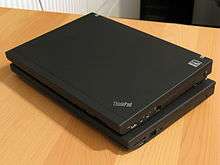
The ThinkPad X Series is a line of notebook computers and convertible tablets originally produced by IBM and now marketed by Lenovo.
IBM announced the ThinkPad X Series (initially the X20) in September 2000 with the intention of providing “workers on the move with a better experience in extra-thin and extra-light mobile computing.”[1] The ThinkPad X Series replaced both the 240 and 570 series during IBM's transition from numbered series to letter series during the early 2000s. The first X Series laptops were "slimmer than a deck of cards" and "lighter than a half-gallon of milk", despite the presence of a 12.1-inch Thin-film transistor (TFT LCD) display.[2] These design values – thin and light – continued to be a part of the ThinkPad X Series laptops even after the purchase of IBM’s Personal Computing Division by Lenovo. The first X Series ThinkPad released by Lenovo was the X41 in 2005.[3]
The ThinkPad X Series laptops from Lenovo were described by Trusted Reviews as combining an ultraportable's weight and form factor with a durable design.[4] The X Series laptops include traditional ultraportables, as well as convertible tablet designs.[5] According to Lenovo, the ThinkPad X Series laptops include low power processors, offer long battery life, and offer several durability features such as a Roll Cage, magnesium alloy covers, and a spill-resistant keyboard.[5]
Models
2000-2004
X40
Specifications:[6]
- Processor: Intel mobile Pentium M processor 1.0 or 1.2 GHz
- Storage: 20GB
- RAM: 256 to 1536 MB
- Display: 12.1-in XGA (1024 × 768) active matrix TFT
- Dimensions: 268 mm × 211 mm × 21 mm–27 mm (10.55 in × 8.31 in × 0.83 in–1.06 in)
- Weight: 1.23 kg (2.7 lb)
Other
2000-2004 also saw the introduction of the X20 (September 2000), X21, X22, X23, X24, X30, and X31. Processors ranged from the PIII (All models until the X31) through to the Pentium M in the X31/X32/X40 series.
2005
X41 Tablet
Three years after the release of the X30, upon acquiring the ThinkPad division, Lenovo released the ThinkPad X41 ultraportable laptop and the ThinkPad X41 Tablet. The X41 Tablet was convertible, with the capacity to function as a tablet PC and an ultraportable laptop.
X32
The X32 was introduced in 2005. The numbering system was a bit confusing, as it was actually introduced after the X40, but using the older X30/X31 chassis design. It was also more powerful than X40 and many X41 units, dues to usage of faster full-voltage processors, and standard 2.5" 5400/7200 RPM hard drives.[7] It was a very short-lived model, discontinued within months after introduction.
2006
The X Series laptops released in 2006 from Lenovo were the X60, X60s, and X60 Tablet.
X60 and X60s
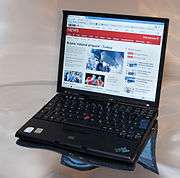
The X60 and X60s slimline differed primarily by their processors: the X60s had a low voltage processor, while the X60 did not. This gave the X60s a lower active temperature and longer battery life in exchange for reduced performance.[8] The X60s also had a smaller heatsink and a thinner case with a different battery form factor, although it could use standard X60 batteries with a plastic adapter.
In its review of the ThinkPad X60/X60s, Notebook Review called the laptop "Hands down the best performing ultraportable on the market", while raising issues about the design and the lack of an optical drive.[8]
The two laptops were available in a variety of different configurations. Later X60 models used 64-bit Core 2 Duo CPUs, and some X60s were available with a lightweight LCD panel. Typical specifications[8] of the laptops are provided below:
- Processor: 1.66 GHz Intel Core Duo T2300E/ Core Solo 1.6 (X60) / L2400 (X60s)
- Operating System: Microsoft Windows XP Professional
- Storage: 80GB 5400RPM
- RAM: up to 2GB DDR2 SDRAM
- Display: 12.1"
- Graphics: Intel Media Accelerator 950
- Weight: starting at 1.64 kg (3.62 lb)
X60 Tablet
The ThinkPad X60 Tablet was praised by reviewers. LAPTOP Magazine said that the ThinkPad X60 Tablet “raises the bar for business-class convertibles”.[9] The most significant issue raised was the low capacity 4-cell battery, which provided a battery life of two hours.[9]
2007
The X Series laptops released in 2007 from Lenovo were X61, X61s, and X61 Tablet.
X61

The X61 especially received mixed user reviews on CNET, with some claiming display problems, and delivery delays, while others praised the laptop for performance and portability.[10]
Reviewers, however, praised the ultraportable. Notebook Review called it an “extremely fast ultraportable”.[11] The display contrast and view angles were criticized, and the palm rest which was prone to heating from the wireless card beneath it.[11]
The specifications[11] of the laptop are given below:
- Processor: From 1.8 GHz Intel Core 2 Duo T7100 to 2.5 GHz Intel Core 2 Duo T9300
- Chipset: Intel 965 Express
- RAM: from 512 MB to 4GB DDR2 PC5300 (8GB are unofficially supported)
- Storage: from 80GB to 160 SATA (any SATA HD or SSD will work, and via BIOS mod it supports SATA-II)
- Screen: 12.1 inch LCD (from many not specified makers, and therefore different qualities)
- Graphics: Intel X3100
- Weight: starting at 1.41 kg (3.1 lb)
X61s
The X61s was praised for its good build quality, performance, and long battery life[12] – the latter of which was an improvement over the X41.
The specifications [12] of the laptop are given below:
- Processor: 1.6 GHz Intel Core 2 Duo L7500
- Chipset: Intel i965M
- Memory: from 512 MB to 4GB DDR2 PC5300 (8GB are unofficially supported)
- Operating System: Microsoft Windows Vista Business 32 Bit
- Hard Drive: 100GB 7200RPM
- Screen: 12 inch
- Graphics Card: Intel X3100
X61 Tablet
The ThinkPad X61 Tablet also received positive reviews, with IT Reviews saying that “the build quality and engineering are second to none and this shines through with the Tablet features which have been executed with something close to genius”.[13] However, the high price and relatively low performance were criticized by the reviewer.[13]
TabletPC Review acknowledged the sturdiness of the X61 Tablet, the high battery life, and the quality of the pen.[14] The features that met with disfavor were the lack of a widescreen, display brightness and colors, and the lack of an optical drive – although the reviewer admitted that the absence helps reduce weight.[14]
2008
The laptops released in the X series in 2008 followed the new naming conventions established by Lenovo. The X Series laptops released by Lenovo in 2008 were X200 and X300.
X200
The ThinkPad X200 was released in 2008. The hardware specifications[15] of the X200 are:
- Processor: Intel Montevina Platform, Core 2 Duo (Penryn Generation) from ULV version SU2300 (1.2 GHz) to 35 W TDP T9600 (2.8 GHz), many 25 W CPUs are also available (P8400, P8600, P8700, etc.)
- Memory: 8 Gigabyte RAM, maximum
- Display: Widescreen display, non-glossy (matte)
- Battery life: Up to 10 hours with a 9-cell battery
- Weight: 1.34 kg / 2.95 lb (with 4-cell battery), 1.47 kg / 3.24 lb (with 6-cell battery), 1.63 kg / 3.59 lb (9-cell battery)
The laptop features cooler components (made possible with the fan design modeled on owl-wings). However, the laptop did not have a touchpad (only the TrackPoint), no HDMI, DVI, or display port, and no built-in optical drive.[15]
X200s
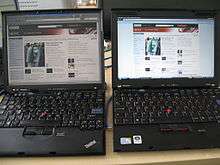
Lenovo released X200s in 2008. It differed from the standard X200 in being lighter, having longer battery life, and running more quietly due to an "owl fan" design for cooling taken from the X300.[16] The X200s was available with more than half a dozen different CPUs and three screens, the top of the range of which was a WXGA+ LED.[17]
X300
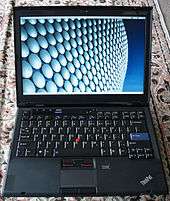
The ThinkPad X300 was also released in 2008. The price at the time of the review by Notebook Review was extremely high, and indicated to be out of range for all but corporate users.[18] LAPTOP Magazine awarded the X300 laptop a score of 4.5 stars, among the highest for a ThinkPad X Series laptop.[19]
The hardware specifications[18] of the X300 are:
- Processor: 1.20 GHz Intel Core 2 Duo L7100
- Graphics: Intel X3100
- Operating System: Windows XP Professional
- Screen: 13.3-inch, LED-backlit display 1440×900
- Memory: 8 Gigabyte RAM, maximum
- Storage: SSD drive
- Optical Drive: Ultra-thin DVD Burner
- Dimensions: 310 mm × 230 mm × 19–23 mm (12.4 in × 9.1 in × 0.73–0.92 in)
- Weight: starting at 1.33 kg (2.93 lb)
The laptop was less than an inch thick, making it the thinnest ThinkPad available at the time.[18] The X300 laptop offered a quick boot with SSD.[18] It also offered a built-in optical drive, uncommon in thin and light notebooks.[18] However, the laptop did not include an SD card reader, had no expansion dock capability, and no ExpressCard or PC Card slot.[18]
2010
The X Series laptops released in 2010 from Lenovo were X100e, X201, X201s, and X201 Tablet.
X100e
The ThinkPad X100e was released in 2010, with Engadget calling the laptop “the perfect solution between a netbook and a larger 13- or 14-inch ULV ultraportable”.[20] Available in two colors (heatwave red and the traditional ThinkPad matte black) the design was compared to that of the Edge series which deviated from traditional ThinkPad design.[20] The X100e, however, despite the choice of colors, retained the “angular edges and boxy build” which “scream traditional ThinkPad design”.[20]
The specifications[21] of the X100e laptop are given below:
- Processor: 1.6 GHz AMD Athlon Neo Single-Core MV-40
- RAM: up to 2GB PC2-5300 DDR2
- Operating System: Microsoft Windows 7 Professional 32 bit
- Display: 11.6 in (290 mm) HD (1366×768) LED backlit anti-glare
- Storage capacity: 250GB 5400RPM SATA
- Graphics: ATI Radeon 3200
- Card reader: 4-in-1
- Web camera: 0.3-megapixel
- Battery: 6-cell
- Dimensions: 280 mm × 210 mm × 15–30 mm (11.1 in × 8.2 in × 0.6–1.2 in)
- Weight: 1.5 kg (3.3 lb) with a 6-cell battery
Mini 10
A modified and re-branded version of the Lenovo X100e, named the Mini 10 was issued to all year 9 students in NSW Australia at the start of 2010. They featured an Intel Atom microprocessor, 160GB HDD, 2GB RAM, a 10" 720p Screen, 0.3MP Webcam and Windows 7 Enterprise.[22]
X201
The specifications[23] of the X201 are given below:
- Processor: Intel Core i5-540M (2.53 GHz, 3MB Cache) or i5-520M (2.40 GHz)
- Graphics: Intel GMA HD Integrated Graphics
- Memory: 4GB DDR3 RAM (1066 MHz 2GB + 2GB) and upgradable to 8GB
- Operating System: Windows 7 Professional (came with either 32-bit or 64-bit)
- Screen: 12.1 in (310 mm) (1280×800) LED backlit
- Storage: 320GB 7200 RPM
- Battery: 6 cell or 9-cell
- Dimensions: 290 mm × 230 mm × 20–36 mm (11.6 in × 9.2 in × 0.8–1.4 in)
- Weight: 1.60 kg (3.52 lb)
X201s
The specifications [23] of the X201s are given below:
- Processor: Intel Core i7-640LM, 2.13 GHz
- Memory: 4GB DDR3
- Graphics: Intel GMA HD (integrated)
- Storage: 320GB 5400 RPM
- Screen: 12.1-inch LED backlit, WXGA+ Resolution (1440×900)
- Operating System: Windows 7 Professional (64bit)
- Battery: 6-cell
- No WebCam & No WWAN Module
- Dimensions: 290 mm × 210 mm × 20–36 mm (11.6 in × 8.3 in × 0.8–1.4 in)
- Weight: 1.26 kg (2.77 lb)
X201 Tablet
The X201 Tablet, released in 2010, was criticized by Engadget for its lack of durability, protruding battery, and 33 mm (1.3-inch) thick body, while praised for its performance.[24] Notebook Review had similar views about the X201 Tablet in terms of both performance and battery life while indicating that the display could have been improved.[23]
2011
The ThinkPad X Series laptops released in 2011 by Lenovo were the X120e, X220, X220 Tablet and X1.
X120e
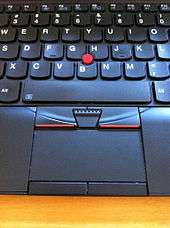
The ThinkPad X120e was released in March 2011.[25] The laptop won "Best Affordable Business Ultraportable" at CES 2011.[26] The laptop’s specifications[27] are given below.
- Processor: AMD Fusion E-240 or E-350 processor
- RAM: Up to 16GB DDR3 1333 MHz (at 1066 MHz)
- Graphics: AMD Vision Pro graphics
- Battery life: 7.5 hours
- Weight: Starting at 1.33 kg (2.93 lb) with a 3-cell battery.
- Dimensions: 282 mm × 208 mm × 15 mm–30 mm (11.1 in × 8.2 in × 0.6 in–1.2 in)
X220
The ThinkPad X220 was released in April 2011.[28] LAPTOP Magazine received the X220 positively.[2] The laptop was praised for its battery life, performance, low weight, display, keyboard, and significantly improved temperature control.[2] However, the web camera did not receive favor – while images were crisp and clear, colors were reported to be muted.[2]
Engadget said the “all-too-familiar ThinkPad can deceive you with its boring business looks, but it's arguably one of the best laptops we've ever tested”.[29] Notebook Review was of the same opinion, stating that the “ThinkPad X220 is quite simply the best 12-inch business notebook we've reviewed so far.”[30]
The laptop’s specifications[31] are given below:
- Processor: Intel Sandy Bridge, up to a Core i7 2640M
- RAM: Up to 8GB DDR3 1333 MHz RAM (unofficially it can support 16Gb and 1600 MHz)
- Graphics: Intel HD 3000 integrated graphics
- Battery life: Up to 9 hours of battery life with a 6-cell battery and up to 15 hours with a 9-cell battery. This battery life could be increased to 23 hours with a 9-cell battery and an external battery pack.[31]
- Weight: Less than 1.8 kg (4 lb)
- Display: 12.5 in (320 mm) 1366x768 (HD) resolution, optionally IPS (wide viewing angles). The X220 was the first non-tablet X series to have an IPS screen option.[32]
- Dimensions: 300 mm × 210 mm × 13–38 mm (12 in × 8.2 in × 0.5–1.5 in) with 6-cell battery
X220 Tablet
The X220 Tablet was also released in April 2011. The Tablet offered the same specifications as the X220 laptop, in terms of processor, graphics, and RAM. The battery life on the X220 Tablet was up to 9 hours with a 6-cell battery and up to 18 hours with an external battery pack and a 6-cell battery.[33] The starting weight of the Tablet was 3.88 lbs.[34]
X1
The ThinkPad X1 laptop was released by Lenovo in May 2011. Notebook Review offered a positive opinion of the ThinkPad X1, saying that it was “A powerful notebook that combines the durability and features of a business-class Thinkpad with the style of a consumer laptop.”[35]
The specifications[36] of the ThinkPad X1 laptop are given below:
- Processor: Up to Intel Core i7-2620M processors
- RAM: Up to 8GB DDR3 1333 MHz RAM
- Graphics: Intel HD Graphics 3000
- Storage Capacity: 320 GB 7200 RPM Hard Disk (or an SSD drive ranging from 128 GB to 160 GB)
- Battery life: Up to 5.2 hours.[37] This could be extended further to 10 hours with a slice battery.[38]
- Weight: Starting at 1.69 kg (3.73 lb)
- Dimensions: 340 mm × 230 mm × 17–21 mm (13.3 in × 9.1 in × 0.65–0.84 in)
2012
The ThinkPad X Series laptops released in 2012 by Lenovo were the X1 Carbon, X131e, X230 and X230T (Tablet).
X1 Carbon

In early August 2012, Lenovo released the ThinkPad X1 Carbon. The X1 Carbon weighs 1.35 kilograms, has a battery life of roughly eight hours, and has a start-up time of less than 20 seconds. The X1 Carbon was first released in China due to the popularity of ThinkPads in that market.[39]
X230
The Thinkpad X230 replaced the earlier X220, introducing a new chiclet-style, 6-row keyboard replacing the older 7-row keyboard style. and Ivy Bridge processor.
The maximum amount of installable memory was 16GB in two memory slots.
X230 Tablet
The Thinkpad X230T (Tablet) replaced the earlier X220 Tablet. Tablet version of the Thinkpad X230. Docking Station compatibility: The Thinkpad X230T (Tablet), is not compatible with previous series 3 docking stations (4337 and 4338). It is only compatible with the UltraBase series 3 "slice base".[40]
2013
The ThinkPad X Series laptops released in 2013 by Lenovo were the X240, X140e and ThinkPad Helix (Convertible Tablet).
X240
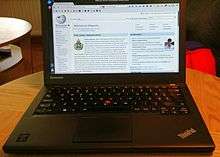
The Thinkpad X240 replaced the earlier X230. Compared to the X230, the X240 changed from the higher wattage Intel Core CPUs labelled as "Mobile class", to the lower wattage CPUs labelled "ultrabook class". Depending on the CPU model, the change resulted in a 10-20% reduction in CPU performance compared to the older, but higher wattage Ivy Bridge generation CPUs.[41] This was the first X series laptop to forgo the classic trackpoint buttons in favour of a touchpad that can also be pushed. The X240 reduced the maximum physical memory to 8 GB, with only one memory slot, making Dual-Channel unavailable (compared to 16 GB Dual-Channel, in two memory slots, on the X230), lost the dedicated Insert key, and lost the dedicated Volume Up and Volume Down keys.
Helix
The Thinkpad Helix was released as an option for corporate IT buyers who were looking for the power of a high-end Ultrabook and mobility of a tablet. The ThinkPad Helix featured a tablet powered by Ivy Bridge components, a docking keyboard, and Wacom digitizer stylus.[42]
2015
The ThinkPad X Series laptops released in 2015 by Lenovo were the third-generation X1 Carbon and X250 during the CES congress.
X250
The Thinkpad X250 replaced the earlier Thinkpad X240, and has a Broadwell processor.[43] Notably, the X250 saw a return of separate trackpoint buttons.
2016
The ThinkPad X Series laptops released in 2016 by Lenovo during the CES congress.
X260
The Thinkpad X260 replaced the earlier Thinkpad X250. This new version adopts the Skylake processors, adds an additional USB 3.0 port and replaces the VGA port with an HDMI port in addition to the existing Mini DisplayPort port.[44]
X1 Carbon 4
The Thinkpad X1 Carbon 2016 is the Fourth-generation X1 Carbon.[45]
See also
- ThinkPad Yoga series
References
- ↑ "IBM announces the new Thinkpad X Series Ultraportable Computer". 11 September 2000.
- 1 2 3 4 Avram Piltch (8 March 2011). "Lenovo ThinkPad X220 Review".
- ↑ "Lenovo Company History". Retrieved 22 June 2011.
- ↑ "Lenovo ThinkPad X300 review". 22 April 2008. Retrieved 20 February 2012.
- 1 2 "ThinkPad X Series Features". Retrieved 20 February 2012.
- ↑ "Detailed specifications - ThinkPad X40". Support.lenovo.com. Retrieved 2014-07-09.
- ↑ Jerry Jackson. "IBM ThinkPad X32 Review (pics, specs)". Notebookreview.com. Retrieved 2014-07-09.
- 1 2 3 Abaxter (19 March 2006). "Lenovo ThinkPad X60s and X60 Review (pics, specs)".
- 1 2 Steve Smith (5 February 2007). "Lenovo ThinkPad X60 Tablet Review".
- ↑ "Lenovo ThinkPad X61". Retrieved 22 June 2011.
- 1 2 3 Kevin O'Brien (20 June 2007). "Lenovo ThinkPad X61 Review".
- 1 2 ZaZ (2 July 2007). "Lenovo ThinkPad X61s Review".
- 1 2 "Lenovo - ThinkPad X61 Tablet review". 15 November 2007.
- 1 2 "Lenovo ThinkPad X61 Tablet PC Review". 12 June 2007.
- 1 2 Andrew (15 July 2008). "Lenovo ThinkPad X200 Review".
- ↑ Jerry Jackson (2008-12-04). "Lenovo ThinkPad X200s Review". Notebookreview.com. Retrieved 2014-07-09.
- ↑ "Category:X200s". ThinkWiki. 2012-08-22. Retrieved 2014-07-09.
- 1 2 3 4 5 6 Andrew (28 February 2008). "Lenovo ThinkPad X300 Review".
- ↑ James Bsales (27 February 2008). "Lenovo ThinkPad X300 Review".
- 1 2 3 Joanna Stern (30 March 2010). "Lenovo ThinkPad X100e review".
- ↑ Jerry Jackson (14 April 2010). "Lenovo ThinkPad X100e Review".
- ↑ "Lenovo ThinkPad Mini-10 Lives, but only for aussie students". 22 April 2010.
- 1 2 3 Kevin O'Brien (22 February 2010). "Lenovo ThinkPad X201 Review".
- ↑ Joanna Stern (23 February 2010). "Lenovo ThinkPad X201 Tablet review".
- ↑ Denise (15 February 2011). "Lenovo ThinkPad X120e Gets March 8 US Release Date".
- ↑ Josh Smith (6 January 2011). "Best Affordable Business Ultraportable: Lenovo ThinkPad x120e".
- ↑ "ThinkPad X120e Tech Specs" (PDF). Retrieved 22 June 2011.
- ↑ "Lenovo ThinkPad X220 comparison". Retrieved 22 June 2011.
- ↑ Joanna Stern (18 March 2011). "Lenovo ThinkPad X220 review".
- ↑ Jerry Jackson (8 March 2011). "Lenovo ThinkPad X220 Review".
- 1 2 "ThinkPad X220 Datasheet" (PDF). Retrieved 22 June 2011.
- ↑ "Detailed specifications - Thinkpad X220".
- ↑ "ThinkPad X220 Tablet Datasheet" (PDF). Retrieved 22 June 2011.
- ↑ "Lenovo ThinkPad X1 Review". PCMag. Retrieved 30 August 2012.
- ↑ Jerry Jackson (16 May 2011). "Lenovo ThinkPad X1 Review". Retrieved 22 June 2011.
- ↑ "ThinkPad X1".
- ↑ "ThinkPad X1 Datasheet" (PDF).
- ↑ Dana Wollman (16 May 2011). "Lenovo ThinkPad X1 review". Retrieved 22 June 2011.
- ↑ "Lenovo unveils lighter, quicker ThinkPad". USA Today. 6 August 2012. Retrieved 6 August 2012.
- ↑ "ThinkPad X230t Convertible Laptop". Lenovo.com. 2012-04-18. Retrieved 2014-07-09.
- ↑ "Lenovo Thinkpad X240 Ultrabook Launched. Details and Specs". Ultrabooknews.com. 2013-09-03. Retrieved 2014-07-09.
- ↑ "Thinkpad Helix". M.lenovo.com. Retrieved 2014-07-09.
- ↑ "Lenovo ThinkPad X250". AnandTech. 4 January 2015.
- ↑ "#CES2016 - Consumer Electronics Show - Lenovo - 2016 CES Product Highlights". #CES2016 - Consumer Electronics Show - Lenovo - 2016 CES Product Highlights.
- ↑ "ThinkPad X1 Carbon". Lenovo.